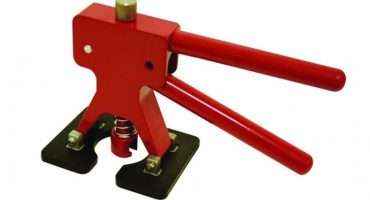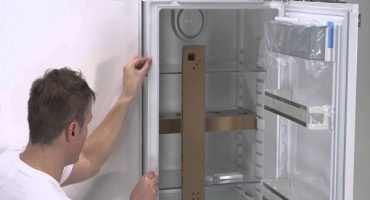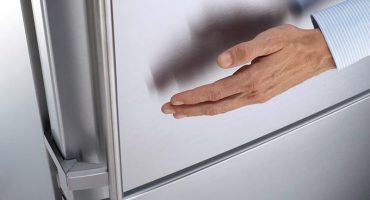Leakage of freon (refrigerant, freon) from the refrigerator is one of the most common types of malfunctions. Neither new nor old refrigerators are safe from such trouble. True, the reasons for this may be different. If the leak occurred with new equipment - most likely you are faced with factory defects. If the refrigerator has been used for a long time, the cause may be due to improper use.
This malfunction is easily eliminated by filling with new freon and restoring the tightness of the joints. But, due to the high volatility of the freon, there may be problems finding a leak.
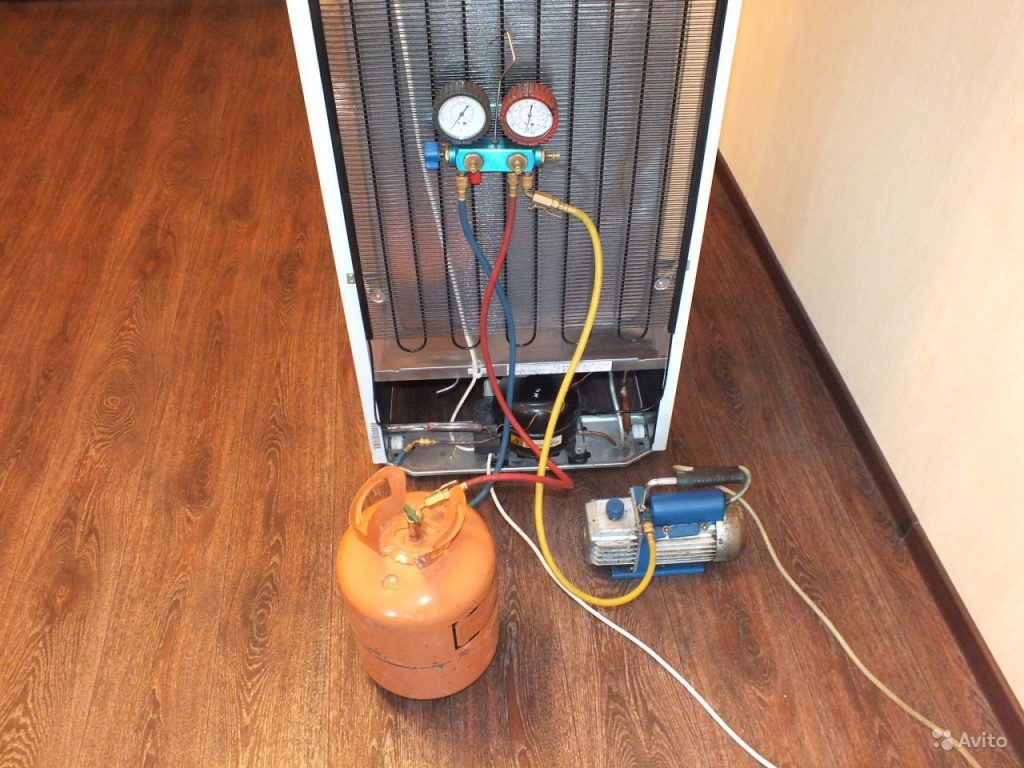
Filling freon in the refrigerator
Where are leaks most likely to occur?
Regardless of the make and model of the equipment, freon most often follows from the following nodes:
- Leaks at the solder points. The most common case. The reason for this may be a manufacturing defect or mechanical damage during operation.

Factory Soldered Refrigerant Leak
- In a crying vaporizer. Most often, this part is made of aluminum and is susceptible to rust. Moisture accumulating in the evaporator leads to corrosion. As a result, the formation of small cracks through which the volatile refrigerant leaves. In modern models, the evaporator is often foamy, which causes additional difficulties in repair. If the leak occurred in the foamy part, complex manipulations with disassembling the case will be necessary.
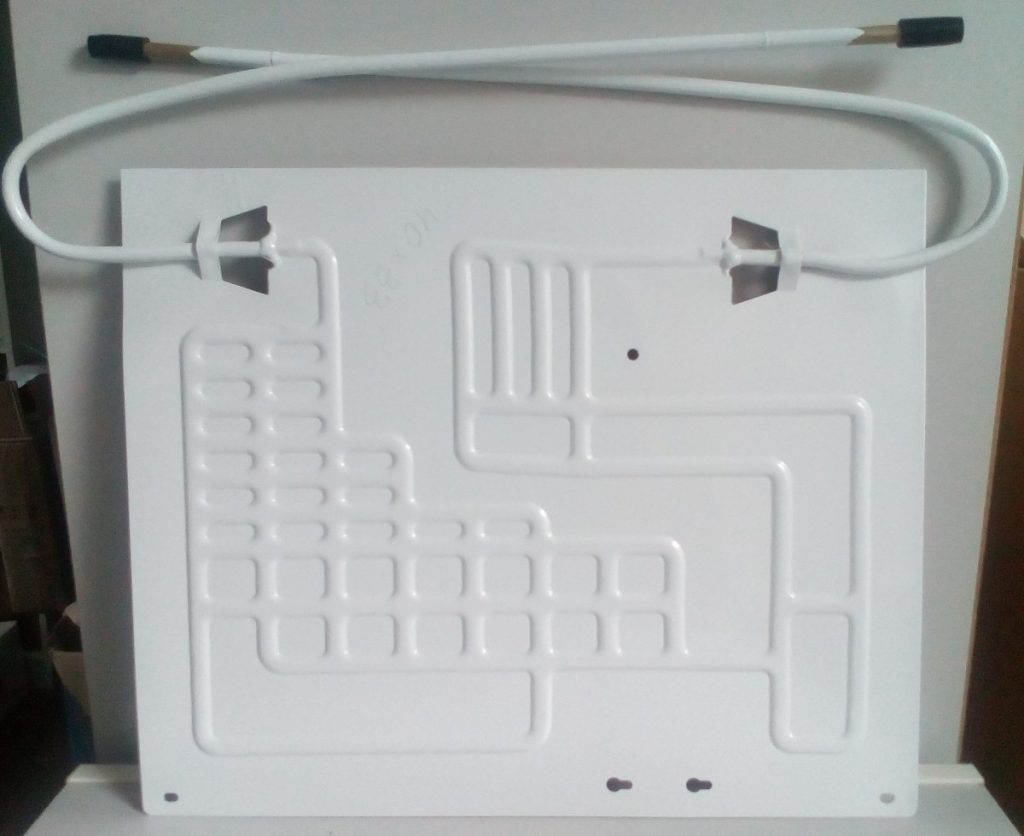
“Crying” refrigerator evaporator
- Gas has come out in the heating circuit. This site, due to constant contact with moisture, is prone to corrosion, which is why this happens. The likelihood of a malfunction increases with the “life span” of your equipment.
How to understand that a leak has occurred
The following symptoms may indicate a refrigerant leak:
- The refrigerator does not cool well. If the release of freon has begun, in the first stage there is insufficient cooling. In two-compressor refrigerators, the problem can only be observed in one of the chambers. In single compressor rooms - in all departments.
- The refrigerator does not turn off. As the amount of refrigerant in the circuit decreases, pressure drops throughout the system. The motor, trying to make up for the flaw, works without turning off.
- The compressor does not turn on. If a leak occurs, the technician continues to work using the remaining gas. After it has completely leaked out, the compressor turns off and the device no longer works.
- Error code, beep, or alarm indication. Take the manual - in it manufacturers indicate the decryption of all codes and signals. If the error code indicates a high temperature in the chambers - most likely, freon has flowed.
- External signs. To understand whether or not freon has left the refrigerator, you can also by visual signs. So, the “snow coat” and icing of the evaporator indicate that depressurization occurred, most likely, in the crying evaporator. Traces of rust will indicate a leak in the heating circuit.
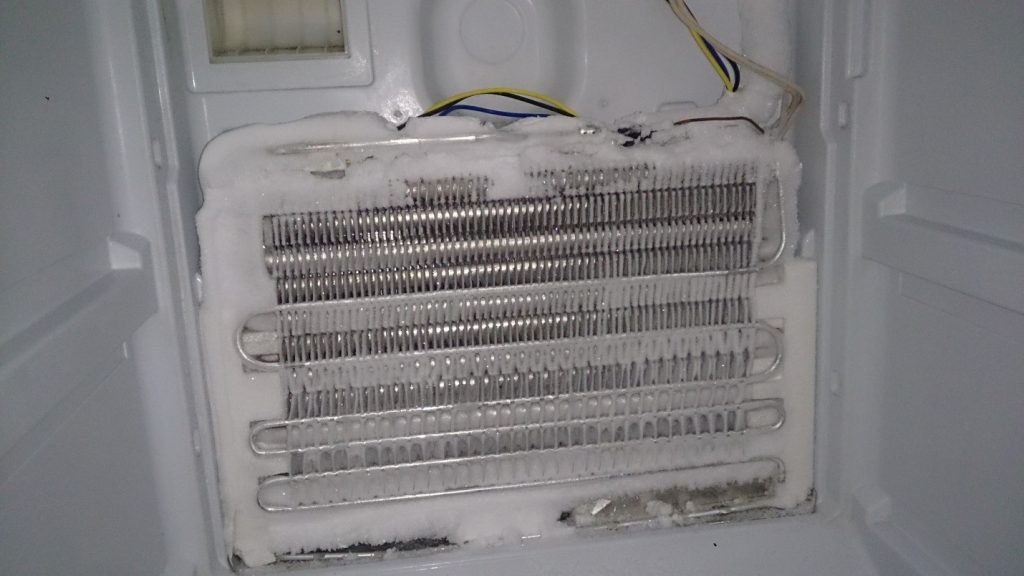
Snow coat on the evaporator is an indirect sign of freon leakage
- Swelling of the back of the refrigerator. In the event of a leak, gas escapes between the walls to form a bubble. It is difficult not to notice visually.
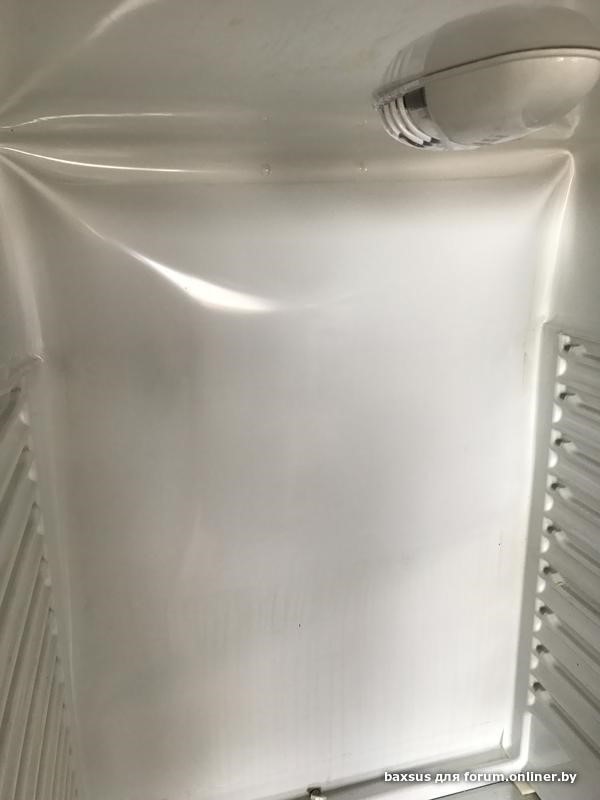
Bloating the back of the refrigerator
Many users who encounter a leak ask themselves questions: is it possible to poison with freon? How dangerous is it to be in the room where the leak occurred? Will there be an explosion?
In household refrigerators contain a small amount of freon.This amount of gas cannot lead to fire, explosion or poisoning.
Let us consider in more detail the characteristics of various types of refrigerants:
In modern models of refrigeration equipment intended for domestic use, isobutane or tetrafluoroethane is used. Both gases are environmentally friendly. Isobutane is combustible and explosive in large concentrations (at a concentration of more than 31 grams of gas per cubic meter of air). To create an environment conducive to explosion, a certain concentration will be required. Given that the typical volume of the kitchen is on average fifteen cubic meters, an explosion will occur at a concentration of more than 400 grams. Isobutane in a completely sealed room. In refrigerators, no more than 200 gr. freon. Therefore, an explosion will definitely not happen, but ventilating the room just in case will not be superfluous. R134a does not ignite and does not cause explosion at any concentration and temperature.
Older refrigeration models used difluorodichloromethane and difluorochloromethane (R12 and R22, respectively). R12 gas does not explode, but in high concentrations leads to suffocation. At temperatures above 330 degrees Celsius it releases harmful compounds. Also, this gas is very harmful to the environment. Difluorochloromethane, on the contrary, has a low ozone-depleting potential, but becomes toxic when heated to temperatures above 250 degrees Celsius.
As described above, even dangerous types of freons are safe in domestic conditions. But to ventilate the room with suspected leakage will not be amiss. And what to do next, after airing?
It is important to understand that refrigerants have high fluidity and the ability to easily evaporate even through microscopic openings. All this makes it difficult to find a leak. To check fridge for leakage, use a leak detector. A specialized diagnostic tool helps to understand where the damage occurred, by the accumulation of gas in the air. Without the necessary knowledge and instruments, it is difficult to do it yourself. Therefore, it is better to immediately contact a specialist. Once again, it should be noted that the master must also fill and seal the circuit.

